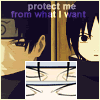Keeper of Hellfire wrote:dokool wrote:Whether AMVs are protected by law is up for debate - yes, it's a derivative work, but at the same time none of the companies involved (read: music labels, anime studios, etc) have given us permission to distribute.
Did you really read my post? It doesn't matter if the work which gets protected by copyright law is based on copyright infringement. To get copyright right protected it has only to fullfill two requirements:
1.)There must be own creative work in it.
2.)That's an irony, 'cause it's that what rises the question if an AMV is legal or not, it has to be published.
dokool wrote:The law's much shakier considering that unlike fanart (in which stuff kinda like the source is drawn), we're actually using the source itself.
It needs less effort to create a copyright protected work than you assume. For example, if you make a collection of criminal stories (from others) and issue them, that collection gets copyright protected. You don't make any change to the original works, what an AMV creator does.
dokool wrote:So, while it technically may not illegal for us to make an AMV (depending on what the current mode of thought is), it is illegal for us to distribute it, show it widely, etc.
That is debatable. Depending on how the law is interpreted, even the publishing of AMV can be covered by several clauses of the copyright law. The only thing what would make it definatly illegal is if you would make money with it without permission of all copyright holders. So that's the point where sasuke2468 is wrong.
I am unsure which copyright law you are referring to since you offer no proof other than your words, but a derivative work must be authorized by the holder of the copyright of the original material. Hence, very few AMVs can be considered to have copyrights as derivative material.
COPYRIGHT PROTECTION IN A DERIVATIVE WORK
The copyright in a derivative work covers only the additions, changes, or other new material appearing for the first time in the work. It does not extend to any preexisting material and does not imply a copyright in that material.
One cannot extend the length of protection for a copyrighted work by creating a derivative work. A work that has fallen in the public domain, that is, which is no longer protected by copyright, may be used for a derivative work, but the copyright in the derivative work will not restore the copyright of the public domain material. Neither will it prevent anyone else from using the same public domain work for another derivative work. In any case where a protected work is used unlawfully, that is, without the permission of the owner of copyright, copyright will not be extended to the illegally used part.
WHO MAY PREPARE A DERIVATIVE WORK?
Only the owner of copyright in a work has the right to prepare, or to authorize someone else to create, a new version of that work. The owner is generally the author or someone who has obtained rights from the author. Anyone interested in a work who does not know the owner of copyright may search the records of the Copyright Office. Or, the Office will conduct a search at a fee of $75* per hour. For further information, request Circular 22, “How to Investigate the Copyright Status of a Work.”
From
http://www.copyright.gov/circs/circ14.html.
I would recommend that anyone that has even the slightest doubt as to what they're talking about with regards to copyright go read through
http://www.copyright.gov or at least the
FAQ before arguing about who knows the correct interpretation(s) of such things.
